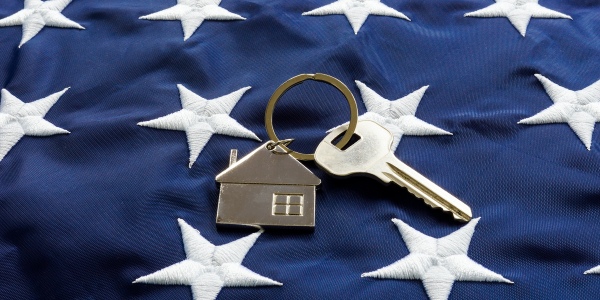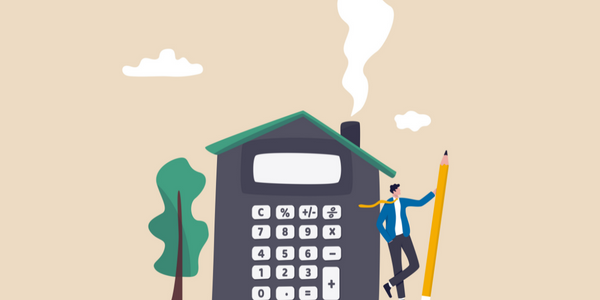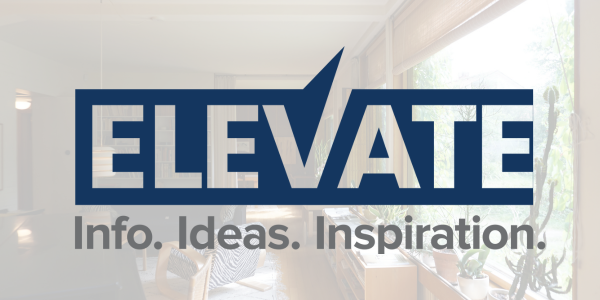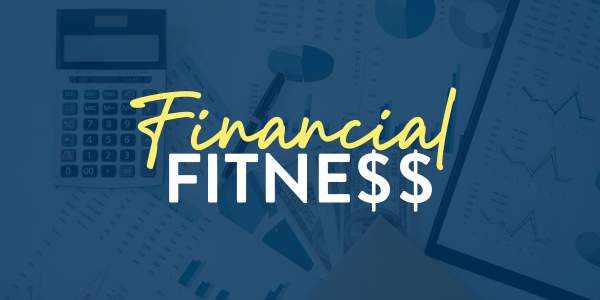
If you or a loved one have served your country and are now looking to buy a home, you may wonder if you qualify for a VA loan.
VA mortgage loans offer tons of benefits, like no down payment requirements, no private mortgage insurance (PMI) monthly payment, and flexible underwriting guidelines.

Below are the most commonly asked questions about VA loans. But first let’s explain who qualifies for a VA loan. You can obtain a VA loan if you are an active-duty service member, veteran, or surviving spouse of a veteran. This includes veterans with service-connected disabilities.
Those who qualify will receive a Certificate of Eligibility (COE) as proof that they are eligible for a VA loan. If you do not have a copy of your COE, your Loan Advisor can assist you.
1. Are There Closing Costs Associated with a VA Loan?
As with many loan programs, VA loans do come with some of the standard closing costs and fees. These include fees you’d see on most loans, including for the appraisal, title search, title insurance, recording fee, and other lender fees.
One fee that is specific to VA loans is the VA funding fee. You pay this one-time fee directly to the VA to keep the loan program going. The size of the VA funding fee depends on a few factors.
For first-time use, the funding fee is 2.125% of the total amount borrowed. The funding fee increases to 3.3% for borrowers who have previously used the VA loan program, but it can be reduced by putting money down. Veterans who are more than 10% disabled may be exempt from this fee.
There are a few ways you can avoid paying the VA funding fee out of pocket. You can negotiate to have the seller pay this fee, or you can roll the funding fee into your mortgage and finance it over the life of the loan.
2. What Credit Score Do I Need for a VA Loan?
Credit score requirements are one of the biggest worries for many homebuyers, but are you ready for some good news? There is no credit score requirement for VA loans.
As exciting as this is, remember that although the VA loan program doesn’t set a minimum credit score, individual lenders do. At APM, our minimum FICO score requirement is 580 for VA loans, which provides applicants more leniency. However, it’s important to note that not all lenders have the same requirement.
It’s also important to keep in mind that the better your score, the better your interest rate and loan terms will be. To learn where you stand, you can obtain your free credit report once a year from each of the three credit bureaus—or you can connect with an APM Loan Advisor by clicking here to set up a free pre-qualification.
If you find that you need help boosting your credit score, our experienced APM Loan Advisors are always here to help. We’re happy to sit down with you to discuss your financial situation and how you can improve your FICO score before applying for a VA loan.
3. How Many Times Can I Use My VA Home Loan Benefit?
As many times as you like. There’s no limit on how many VA loans you can take out in your lifetime.
The only caveat is that VA loans must be used only to purchase or refinance a primary residence. In addition, your entitlement—the amount the VA is willing to guarantee for your loan—is finite. Some veterans with a partial remaining entitlement can get another VA loan if the remaining entitlement is sufficient. Your Loan Advisor can help with that calculation.
Normally, you’d have to sell the home that is financed under the VA loan to restore your full entitlement. However, the Department of Veterans Affairs offers a one-time entitlement restoration for individuals who have paid off their VA loan but still own their property. This perk can be used whether the loan was paid off entirely or refinanced into a different loan, such as a conventional mortgage.
4. Can I Have Two VA Loans?
You sure can. VA loans are technically used for primary residences, but primary residences change all the time—especially for active service members. For example, you can use a VA home loan program to buy your primary residence. Then, if you receive orders to move, you can take out another VA loan to purchase your new primary residence—as long as your entitlement covers both.
The best part about having multiple VA loans is that you don’t have to sell your old home. You can use it as a rental property and earn supplemental income while your original VA loan remains intact.
Naturally, you will have to qualify for the VA loan again. You may also be limited in how much you can borrow the second time around, depending on your VA loan entitlement.
5. Can I Use a VA Loan to Buy Land?
A VA loan doesn’t allow you to purchase land by itself, but it does allow you to buy land that you plan to build on. So you can use a VA loan to buy land if you finance the costs associated with that land and the construction of your new home at the same time.
You could also finance the cost of the land through a conventional loan and then use a VA loan to fund the construction of a home that will sit on that land. Your third option is to finance both the cost of the land and the construction of the home through other means, such as a short-term construction or bridge loan, and then refinance into a VA loan once the home is built.
There are a few more rules you may need to consider before purchasing land using a VA loan. An APM Loan Advisor can go over those with you.
6. Can I Refinance a VA Loan?
By now you’ve probably gleaned that, yes, you can refinance a VA loan. You can obtain a VA-backed cash-out refinance or an interest rate reduction refinance loan (IRRRL). Like your initial VA loan, you’ll work with a lender like APM (not the VA) to refinance your loan.
While the VA IRRRL loan is a streamlined process that requires less paperwork on behalf of the borrower, you will need to supply the lender your COE. For a cash-out refinance, you will need to provide most of the paperwork that comes standard for home financing. There are some restrictions on the equity required for cash-out refinances, but VA mortgage rates are typically in line with other government products like conventional loans.
Closing fees do apply on VA refinances. In addition, there is also a VA funding fee that you can finance into your new loan amount. It’s always a good idea to consult with a trusted Loan Advisor to make sure the terms and cost of refinancing are worth it and will save you money in the end.
Taking the First Step
The VA home loan benefit is one of the ways our country and companies like APM say thank you to military personnel and their families for the sacrifices they have made in the name of our freedom. Our job is to make the homeownership journey as easy as possible for you and your family.
At APM, we truly believe that the VA home loan benefit is one of the best ways to make that happen. For more information on VA loans, you can download our free guide by clicking here, or click here to connect with an APM Loan Advisor.







